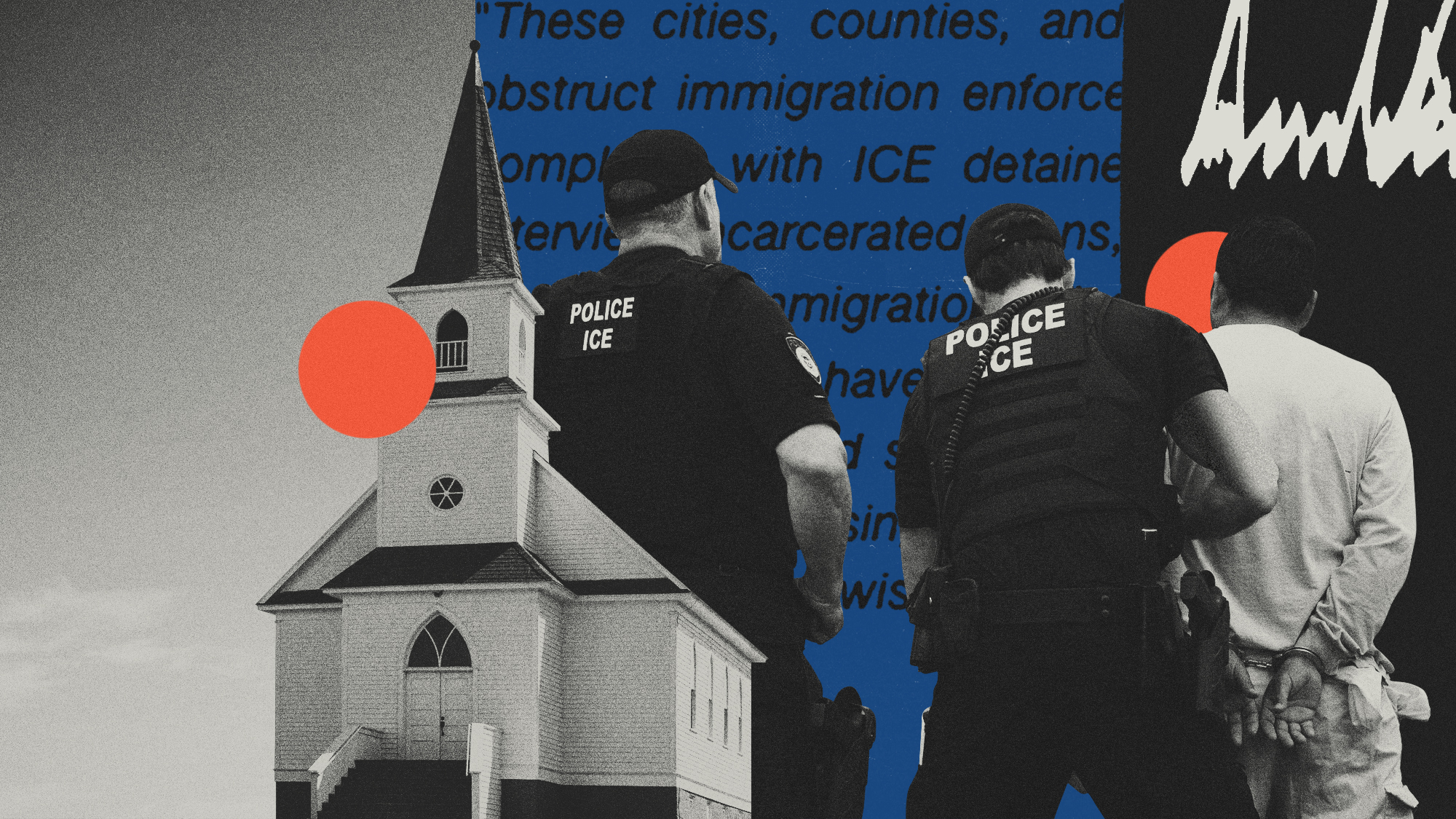What does Trump's immigration crackdown mean for churches?
Mass deportations come to 'sacred spaces'


A free daily email with the biggest news stories of the day – and the best features from TheWeek.com
You are now subscribed
Your newsletter sign-up was successful
Churches have long served as sanctuary to those fleeing the long arm of the government. No more. A new directive from President Donald Trump's administration will allow federal agents to enter places of worship to seek and capture undocumented migrants.
The move ends decade-old rules that kept immigration agents from "carrying out immigration enforcement in sensitive locations," said The Associated Press. Authorities can now make arrests at churches (as well as schools) as part of the Trump administration's efforts to carry out mass deportations. Migrants will "no longer be able to hide in America's schools and churches to avoid arrest," the Department of Homeland Security said in a statement.
Some religious leaders are pushing back. Faith communities have an "executive order from God, not from politicians," said Guillermo Torres of Clergy and Laity United for Economic Justice to the Los Angeles Times. The concept of sanctuary is "deeply rooted in Christian tradition," said the Times. But other pastors expect to be more accommodating. Undocumented migrants are the "equivalent of anybody else who's breaking the law," said Rev. Lorenzo Sewell of 180 Church in Detroit.
The Week
Escape your echo chamber. Get the facts behind the news, plus analysis from multiple perspectives.

Sign up for The Week's Free Newsletters
From our morning news briefing to a weekly Good News Newsletter, get the best of The Week delivered directly to your inbox.
From our morning news briefing to a weekly Good News Newsletter, get the best of The Week delivered directly to your inbox.
What did the commentators say?
The Catholic Church in America has "long made caring for immigrants a hallmark of its ministry," said William K. Reilly at The New York Times. And Catholic clergy along the U.S.-Mexico border are "gearing up to help parishioners facing deportation." That's why the church "must be fully engaged and vigorously oppose" Trump's plans for mass deportations. So far, though, church officials have been "muted on the national stage." It is time they became more vocal, Reilly adds. The new administration's deportations are a matter of "profound moral significance that should engage us all."
The Trump administration has a "Catholic problem," said Christopher Hale, formerly of Catholics for Harris, at Newsweek. The United States Conference of Catholic Bishops has "rightly condemned the new policy as a violation of sacred spaces" that would erode trust between churches and the communities they serve. Republicans and conservative Catholics have aligned on issues "like abortion and religious liberty," but the administration's decision to target "sacred spaces" for arrests suggests a "stark contrast with Catholic values."
What next?
The administration's order isn't popular. About 57% of respondents in a recent poll said they are "strongly or somewhat" opposed to making deportation arrests in churches, said The Hill. Just 20% said they supported the new rule.
At least one religious group is taking the matter to court. A group of Quaker congregations has sued the Trump administration, said Bloomberg. The threat of immigration arrests "deters congregants, especially immigrants, from attending services," the churches said in their complaint. And that, they added, violates the First Amendment and federal law by "burdening the rights of congregants to exercise their religion without a compelling reason."
A free daily email with the biggest news stories of the day – and the best features from TheWeek.com
Joel Mathis is a writer with 30 years of newspaper and online journalism experience. His work also regularly appears in National Geographic and The Kansas City Star. His awards include best online commentary at the Online News Association and (twice) at the City and Regional Magazine Association.
-
 Health insurance: Premiums soar as ACA subsidies end
Health insurance: Premiums soar as ACA subsidies endFeature 1.4 million people have dropped coverage
-
 Anthropic: AI triggers the ‘SaaSpocalypse’
Anthropic: AI triggers the ‘SaaSpocalypse’Feature A grim reaper for software services?
-
 NIH director Bhattacharya tapped as acting CDC head
NIH director Bhattacharya tapped as acting CDC headSpeed Read Jay Bhattacharya, a critic of the CDC’s Covid-19 response, will now lead the Centers for Disease Control and Prevention
-
 NIH director Bhattacharya tapped as acting CDC head
NIH director Bhattacharya tapped as acting CDC headSpeed Read Jay Bhattacharya, a critic of the CDC’s Covid-19 response, will now lead the Centers for Disease Control and Prevention
-
 Judge orders Washington slavery exhibit restored
Judge orders Washington slavery exhibit restoredSpeed Read The Trump administration took down displays about slavery at the President’s House Site in Philadelphia
-
 How are Democrats turning DOJ lemons into partisan lemonade?
How are Democrats turning DOJ lemons into partisan lemonade?TODAY’S BIG QUESTION As the Trump administration continues to try — and fail — at indicting its political enemies, Democratic lawmakers have begun seizing the moment for themselves
-
 ICE eyes new targets post-Minnesota retreat
ICE eyes new targets post-Minnesota retreatIn the Spotlight Several cities are reportedly on ICE’s list for immigration crackdowns
-
 Judge blocks Hegseth from punishing Kelly over video
Judge blocks Hegseth from punishing Kelly over videoSpeed Read Defense Secretary Pete Hegseth pushed for the senator to be demoted over a video in which he reminds military officials they should refuse illegal orders
-
 How did ‘wine moms’ become the face of anti-ICE protests?
How did ‘wine moms’ become the face of anti-ICE protests?Today’s Big Question Women lead the resistance to Trump’s deportations
-
 Judge blocks Trump suit for Michigan voter rolls
Judge blocks Trump suit for Michigan voter rollsSpeed Read A Trump-appointed federal judge rejected the administration’s demand for voters’ personal data
-
 The UK expands its Hong Kong visa scheme
The UK expands its Hong Kong visa schemeThe Explainer Around 26,000 additional arrivals expected in the UK as government widens eligibility in response to crackdown on rights in former colony
